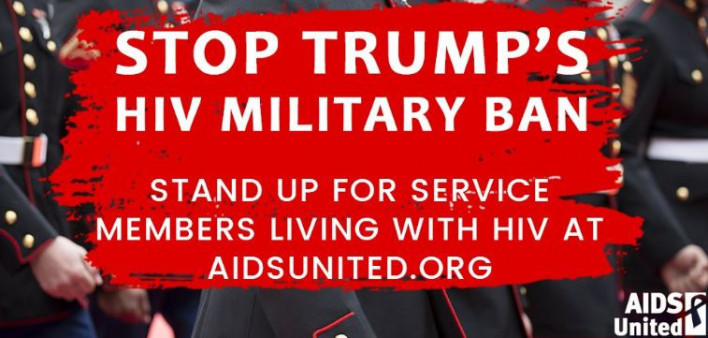Over the course of the month, AIDS United has been highlighting the alarming impact that a new discriminatory Trump administration policy would have on the more than 1,200 dedicated individuals living with HIV who serve in the U.S. military. As it turns out, this is just one of a plethora of Department of Defense (DoD) actions relevant to people living with HIV, and we wanted to update folks on some of those developments.
First up is the new Trump administration policy, labeled by some as “Deploy, Or Get Out,” aimed at improving military readiness by requiring the military to discharge any service member who cannot be deployed for at least 12 months. Unfortunately, thanks to severely outdated military policy, people living with HIV are automatically disqualified from deployment. As a result, should the administration allow the policy to take effect on Oct. 1, it will mean the discharge of approximately 1,200 currently serving personnel living with HIV and will effectively bar any future enlistment of people living with HIV. You can take action on our website, and urge the administration to withdraw this policy here.
Next up is a request for comments on a Veterans Administration policy affecting transgender veterans. As we alerted readers in March, the Trump administration has twice sought to bar transgender individuals from serving in the military, but it has also sought to prevent the Veterans Administration from covering costs associated with gender reassignment surgery. This was made official policy in 2016. But thanks to advocates’ efforts, the Veterans Administration is seeking comments from the public on a request that they remove the “gender alterations” exclusion and allow for these surgeries to be covered when deemed medically necessary. Comments are due September 7.
Finally, the CDC published an article in a recent Morbidity and Mortality Weekly Report examining PrEP (pre-exposure prophylaxis) use in the U.S. military, and it included some interesting findings. Since the repeal of the military’s “Don’t Ask, Don’t Tell” policy in 2011, an increasing number of active duty personnel have accessed HIV prevention services and PrEP in the military health system. But only about 2,000 of the estimated 12,000 servicemembers that could benefit from PrEP are currently using it.
The report notes that a survey of military health care providers, found 49% had rated their knowledge of PrEP as poor, and only 29% reported ever having prescribed PrEP. In addition, 51% of the providers indicated a need for more clear evidence of PrEP’s safety or efficacy. The authors note, “Despite the universal access to care afforded to service members by the military health care system, there is a recognized need to improve and expand access to PrEP for those patients at highest risk for HIV infection.”
DoD is developing a new policy to address access to care challenges and increase PrEP availability. But as the article notes that each year, approximately 350 new HIV infections are diagnosed in members of the U.S. military services, with most infections acquired within the United States. A fact that the administration should keep in mind when considering its proposed HIV military ban. AIDS United will continue to monitor the administration, and DoD policies impacting people living with or at risk of HIV and weigh in with policymakers on behalf of the HIV community.








1 Comment
1 Comment